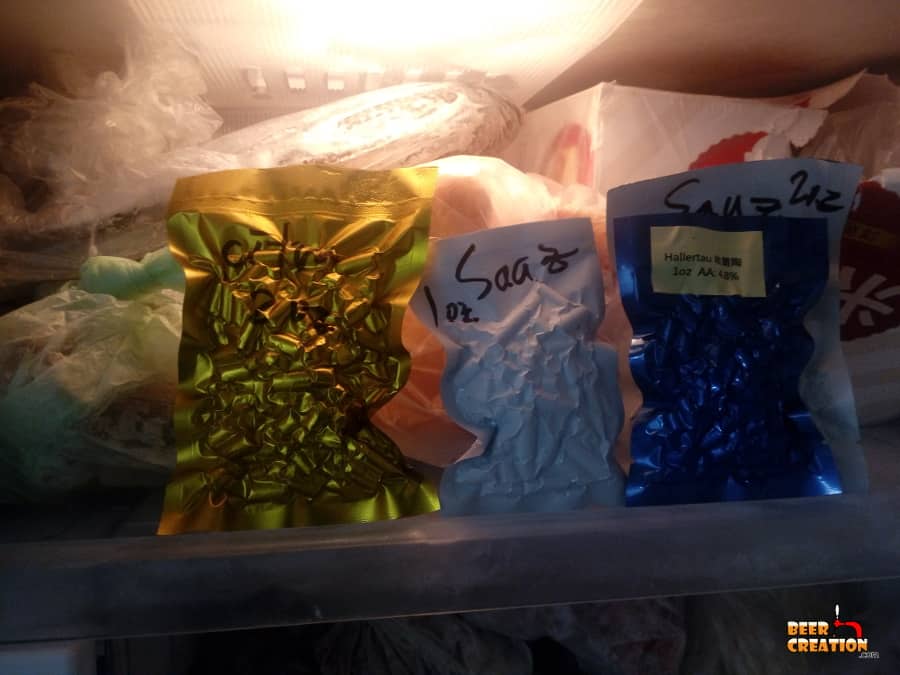When it comes to making a tasty, aromatic homebrew, one of the most important variables is the freshness of your hops.
If you’ve been brewing for a while, or even if you’ve taken a recent break, we’ve all come across the situation when we’ve reached into the back of a freezer and found an ounce of Citra, or perhaps a more archaic blend.
On the other hand, you might have just visited your local homebrewing store (I went today, best day ever!) and then suddenly something comes up to postpone your next brew day.
There’s always that debate, is it still good? Can I and should I add it into my next batch?
Dried, compressed hops (pellet hops) that have been properly stored in an unopened, airtight container remain fresh in the freezer for up to five years. Unopened dried whole hops, which are less stable, can be frozen for six to twelve months. In general, heat, oxygen, & light degrade hops quality.
That’s the short and sweet answer, but if you’re anything like me, you’re looking for a bit more detail.
For instance, what’s the best container for storing hops? Can you thaw hops and then refreeze them?
Are the “rules” the same for pellet hops, whole hops, and fresh hops? And that age-old question: what if I just keep them in the fridge?
Keep reading, because I’ve got those answers (and more) in this article!
Can hops be stored in the fridge?

As a rule, always store your hops in a cold place in a sealed package. Normally that’s no issue because for the most part you’ll be buying your hops in sealed packets. (shop for your hops online at homebrewing.org).
However, if you only make it to the local homebrew store once in a while and like to stock up, as I did earlier today, hop storage can become a little trickier.
For example, you may only need half an ounce of a hop variety for the batch you want to brew today and plan to reuse that other half an ounce for another brew in the future.
In these cases, storing your hops properly is really important if you want to produce the best possible beer.
Once a bag of hops has been opened, fridge storage will only help preserve the hops’ alpha acids for a few days, and that’s assuming the container is totally airtight.
So if you’re going to be brewing within two days or so, go for it. Otherwise, pop those hops in the freezer.
New to homebrewing? Please feel free to read my ultimate guide to brewing beer at home and where to start.
What’s the ideal temperature for hop storage?
Heat will really take a toll on the alpha acids in our hops. In fact, the rate of hops deterioration gets cut in half for every 27 degrees F (15 C) drop in temperature.
So, let’s just say the best temperature for ensuring hops are in optimal condition is “as low as possible.”
If you’re looking for a nice round number, 30 to 5 degrees Fahrenheit (-1 to -21 degrees Celsius) is ideal.
If possible, you should set your chest freezer to this temperature if you are storing hops and other brewing ingredients in it. I really cannot recommend getting an Inkbird ITC-308 temperature controller enough.
I picked a couple up on Amazon for less than 50 bucks each and I use them for all my temperature control needs.

What other factors effect hops’ quality?
Besides avoiding heat and ensuring you haven’t kept them too long, you want to keep hops away from oxygen and light. These will make them degrade faster.
The variety of the hops also matters. Some hops age faster than others. There are several tools available on the Web that let you calculate the alpha percentage in your hops depending on hops variety, form (pellet, etc.), storage temperature, container, and time.
If you aren’t already a fan, which I am a huge one, check out this helpful resouce on beersmith.com.
What container should I store hops in?
When it comes to what to store hops in, the absolute best is oxygen barrier vacuum bags. You can even get yourself a home vacuum sealer system (see Amazon), which can be used for plenty of other kinds of food storage.
Mylar bags, also available on Amazon, (the ones that look like aluminum foil) are preferable if you’re going to keep the hops in the freezer for the long term, but otherwise, standard plastic vacuum bags are fine.
And honestly, food saver bags or airtight Mason jars do the job, too.
If all that fails, go an have a chat with your local homebrew store and I’m sure they’ll let you seal up your hops while they look the other way!
What should I do to hops before freezing them?
Preparing for storage is fairly simple if you’re using pellet hops or dried whole hops.
Basically, if you’re using a regular food storage bag and you don’t have a vacuum sealer system, you’ll want to push all the air out around the hops as much as you can. Really get that air out.
You might hear some brewers concerned with rupturing the oil glands on whole hops when pushing the air out, but don’t worry about that.
Think of it like this: pellet hops have had their oil glands ruptured for sure, but they still work amazingly for both flavor and aromatics, right?
The costs of not removing the air from that bag of whole hops—or even worse, not freezing them! —far outweigh any potential advantages.
However, this above advice (get the air out and go) only holds for dried hops.
If you’re working with homegrown hops (wet hops) and plan to use them later rather than immediately in a wet-hopped beer, you’ll need to dry the hops before storing them.
How to dry fresh hops for storage?
Fresh hops can be dried with a food dehydrator, your oven (keeping it well-ventilated), or you can fashion a hop-drying screen out of something like a regular air filter or window screen.
It’s important to dry the hops for no longer than three days and at temperatures no higher than 140 F (60 C).
Keep in mind you’re inevitably going to lose some of the aromatics in the drying process, but you can preserve other desired attributes by keeping the temperatures no higher than 140 F.
How to tell if hops have gone stale?
Give them a trusty ol’ sniff test. If you don’t smell anything, or if what you smell doesn’t immediately make you think, “yeah, I want to bottle and drink that,” then toss them out.
Hops don’t “spoil” like food. Their aroma and flavor capacities just fade away. In other words, if you use stale hops, your beer is going to be extremely disappointing, not dangerous.
Now this is sometimes the case with that old packet of Citra which fell behind that frozen ribeye way back when. It can also be the case if you are buying extract kits.
I have nothing against brewing beer from extracts, that’s how they did it during The Prohibition, but whenever you buy a brewing kit, you never really know how long it’s sat on the shelf.
Just check the dates and the smell to be sure!
Can hops be refrozen after thawing?
Technically, this is okay. People do it and still make good, hoppy beer, but I wouldn’t recommend freezing, thawing, and refreezing more than a few times if you really want optimal alpha acids.
It’s better to portion out your hops into the amounts you’d use in a batch and freeze them that way, so that you don’t have hops that have been warmed and then refrozen through too many cycles.
Better yet, when visiting your LHBS, have your next brew batches planned out so that you don’t end up buying a much bigger quantity of hops than you need.
Fresher is always better!
Do chest freezers keep hops better than fridge freezers?
I’ve included this question because some brewers feel a lot more confident keeping their hops in a chest freezer than the regular fridge freezer.
Why? Because chest freezers get opened less often, allowing less light inside (from the environment and from the fridge unit itself) and keeping more consistent temperatures.
It’s a logical theory considering what we know about hops’ enemies (light, oxygen, heat), but it’s honestly not necessary.
In my limited but enthusiastic experience, I’ve hardly ever stored hops in anything other than foil bags or plastic packaging. So light isn’t really an issue, although loss of temperature could be.
If you have a chest freezer, go for it. If not, don’t run out and buy one, not unless you are thinking about setting up your own fermentation chamber (see my article), which is a really helpful thing to do.
Just keep your hops airtight in their container and maybe stick them behind some other items in the back of the freezer.
Do pellet hops keep longer than whole hops?
Yes, as a matter of fact, they do! Pellet hops are compressed, so they actually look like rabbit pellets. Compared to whole hops, they have a smaller surface area, which means oxidation is less likely to occur.
If you were to freeze an unopened, airtight bag of pellet hops and a bag of whole hops under the same conditions, take them out after six months or so and give both a good sniff, you’d notice the aroma coming off the pellet hops would be much stronger.
Not only that, but you might even get some off-note whiffs from the whole hops.
All this means is that you want to pay attention to how long your whole hops have been in the freezer. They should be good for six months to a year. Any longer, and you probably need to just get some new hops.
Are there other benefits to pellet hops?
Because they’re compressed, pellet hops take up less storage space. They can be easier to measure as well.
Also, you get more bang for your buck with pellet hops in that they have a roughly 10% higher extraction efficiency by weight compared to whole hops.
In other words, one ounce of pellet hops yield more bitterness than one ounce of the whole hops.






